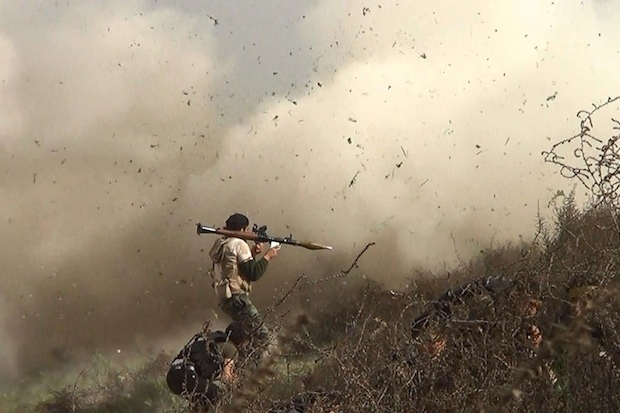There is something deeply disturbing about switching on the television and finding Jack Straw talking about the need to take military action against a Ba’athist dictator who is using weapons of mass destruction against his own people. Tony Blair has also popped up to urge moral purpose. And all this before the UN weapons inspectors have put pen to paper. The decision-making over Syria is following the same skewed logic, making the same wrong turns as last time. Except that with Iraq there was at least a clear preliminary plan: invasion, followed by regime change and the introduction of democracy. The plan for Syria offers no such clarity.
Reports of up to 1,800 people killed by sarin gas by Bashar al-Assad’s regime are chillingly credible. Atrocities are being perpetrated there every day, and by all sides (there are now far more than just two sides). It is often said that there have been 100,000 casualties so far. What we seldom hear is that this figure includes 27,000 killed by the rebels — some of whom have shown themselves at least equal to Assad in their barbarity. Earlier this week they beheaded a cleric whom they found guilty of apostasy. The black flag of al-Qa’eda is flying over rebel-held villages where summary executions have been going on for some time. Were they to take Damascus, we can imagine what type of regime would follow.
It is a depressing testament to the weakness of Nato militaries that, from London to Istanbul, what ‘taking action’ in Syria really means is lobbying the White House to use the US Navy. But this problem is self-inflicted. Europe has been cutting back on its military for decades, a process which David Cameron accelerated when he decided (for instance) that Britain can go without aircraft carriers and that the Army should be cut to levels not seen since the 19th century. Barack Obama’s attention lies on the other side of the Pacific, not the Atlantic. He has no stomach for this fight, and is mulling action mainly because he threatened ‘consequences’ if chemical weapons were deployed. Having put his credibility on the line, he has to act.
But such a limited, wrist-slapping response can demonstrate weakness rather than strength. The Taleban were hardly deterred when Bill Clinton’s government fired missiles into Afghanistan in 1998 in retaliation for an attack on American embassies. The Pentagon has already made it clear that it has no intention of weakening Assad’s regime — perhaps because the idea of jihadis controlling the chemical weapons stashes is even more terrifying. We are, in effect, asking Assad if he would please kill his enemies using conventional means.
This is why the argument for intervention falls so flat: it lacks purpose. In Afghanistan, Iraq and Libya the purpose was to replace dictatorship with an elected leader. In Sierra Leone the aim was to stop the hand-amputating guerrillas laying waste to Freetown. In Syria, the aim is just to make a gesture — to fire Tomahawk missiles towards Damascus to honour Barack Obama’s threat of ‘consequences’ for Assad.
Normally, a recalled parliament is just an expensive therapy session for politicians who feel the world needs to know what they have to say. But this time the debate has served to tease out the complexities that were too easily brushed aside over Iraq. Adam Holloway, an ex-soldier, has said he would back military action if it had a purpose. But, he asks, what will this achieve? The Americans have all the missiles they need. The most effective way in which Britain can help is by giving support to Assad’s local enemies: Turkey, Lebanon and Jordan. Our military options are very limited.
This is not apparent from the Prime Minister’s language. He talks as if he wishes actually to intervene; to stop the fighting. His more hawkish advisers describe Syria as a test case for non-intervention as if the 100,000 death toll was somehow a result of a British policy. The Prime Minister also uses similar language, introducing the concept of ‘standing idly by’. He has placed himself in a new but widely shared tradition which regards humanitarian intervention as lawful war, legitimised by a responsibility to protect. There was a time when Tony Blair wanted to make this British policy. If the Rwandan genocide were to happen again, he said, ‘we would have a moral duty to act there’.
These are noble aims. But the world is, alas, full of conflicts — with death tolls that exceed Syria’s. Tajikistan’s civil war killed 50,000, Algeria’s and Congo’s 150,000 and 300,000 have died in Darfur. But Britain did not intervene in any of them for a simple reason: we could not see how we could (or should) help. The same is, tragically, true for Syria today. Arming the rebels will guarantee further deaths. And a rebel victory could boost al-Qa’eda and simply usher in a new phase of war, with brutal sectarian reprisals.
In recent years Britain has acquired a dangerous habit of willing the ends but not the means. This led to the debacle of Basra, which was left to the mercy of Shi’ite death squads because we did not put in enough troops to keep the peace. In Afghanistan our badly equipped troops needed American reinforcements when things got out of control. The lesson of the Blair years is not to play a game you cannot win.
Cameron’s instincts are honourable, and he is right to see Britain as a country that seeks to shape the world, rather than be shaped by it. He has perhaps surprised even himself with his interventionist instincts and the extent to which he dislikes ‘standing idly by’. But having scaled back the military so much, he had better get used to it.






Comments